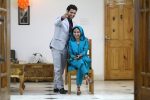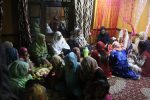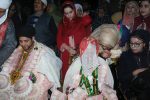 Stanzin Saldon and Murtaza Agha are trying to bridge a Buddhist-Muslim divide
Stanzin Saldon and Murtaza Agha are trying to bridge a Buddhist-Muslim divide
Source: The New York Times (also appeared in India Abroad Oct, 2017)
In front of a tin-roofed house with the Himalaya Mountains rising behind it, about 300 wedding guests waited on a big green lawn, eager for the arrival of the bride and groom.
As the couple appeared, the guests formed a happy scrum around them, whisking them through the doorway and into the house. The rooms smelled of the coming feast: tandoori chicken, salty tea, fresh rolls and succulent goat meat cooked in yogurt and spices.
But the bride’s entire family was conspicuously missing from the party.
The bride, Stanzin Saldon, is from a Buddhist family, and the groom, Murtaza Agha, is a Muslim. Both grew up in Ladakh, a remote region of Jammu and Kashmir State in India. So what happens around here when a Buddhist woman falls for a Muslim man? Chaos.
The young couple’s romance has spawned protests, shut down businesses, caused fistfights and pitted Muslim and Buddhist leaders against each other. The police have been forced to intervene, and so have the courts.
For several days the two even had to go on the run. They drove around the nearby Kashmir Valley, which is crawling with militants and soldiers, worried sick about being caught together.
 But Saldon, flush with fresh love, would do it all over again. “We found peace in a conflict
But Saldon, flush with fresh love, would do it all over again. “We found peace in a conflict
region,” she said earnestly. The Ladakh region is widely considered one of India’s most charming spots. The main town, Leh, feels like a glass museum case of traditional Buddhist culture delicately perched on a shelf high in the Himalayas. Each year, thousands of Indian and foreign tourists come here to stroll around the old Buddhist monasteries, take pictures of the saffron- robed monks and eat yak cheese pizza.
In the west lies the mainly Muslim town of Kargil, where green-domed mosques rise behind stores with Arabic names. Taking Kargil and Leh together, this region’s population is around a quarter million, split roughly in half between Buddhists and Muslims, along with a few Hindus.
In Leh, Buddhist women grumble that there aren’t enough Buddhist men around because so many have become monks.
The Buddhist-Muslim divide seems to be getting sharper in this part of the world. Neighboring Bangladesh is struggling to absorb hundreds of thousands of Muslim Rohingyas, an ethnic group from Myanmar, who recently fled atrocities by Myanmar’s military and Buddhist majority.
But to Saldon, 30, and Agha, 32, none of this mattered.
Theirs is a Ladakh love affair, through and through. They met on a college trekking trip to the Himalayas. They kept in touch. Agha, a government engineer, and Saldon, a social worker, both
lived in the city of Jammu, south of Ladakh, and they couldn’t stop calling each other for coffee and lunch. Saldon said she could feel herself falling in love with the soft-spoken and gentle-mannered Agha. But she kept it a secret.
After she was nearly killed in a rickshaw accident, though, she recalled, “It was Murtaza’s face
that floated before my eyes. I decided life was too short and I should confess my love.”
Agha, who grew up in Kargil, couldn’t have been happier. But when he told his
family he wanted to marry a Buddhist girl from Leh, his father’s response was: impossible.
“Why marry a Leh girl?” his family kept asking. There were so many more Muslim
options.
In July 2016, with help from one of Agha’s uncles, the couple held a very small private wedding under a clear blue sky by one of Kargil’s sparkling mountain streams.
Then they went back to their jobs, the world oblivious to their relationship. They maintained
separate homes, planning to one day unite.
But soon their family members found out. While . Agfa’s people took it in stride, Saldon’s went berserk. They pulled her out of Jammu and locked her in the family home in Leh. Her father spat in her face, and later called on shamans to perform ceremonies to try to make her forget about Agha, she said.
 Saldon said she lost 20 pounds. She was heartsick to be away from Agha and terrified of her father, who kept screaming at her.
Saldon said she lost 20 pounds. She was heartsick to be away from Agha and terrified of her father, who kept screaming at her.
“I was totally cut off from the outside world,” she said. “I feared death as my father shouted,
‘Why did you not die no sooner than you were born?’’’ One morning she sneaked out. She knew her family would chase her, so she went to court and won a restraining order demanding that they leave her alone. But the problem was bigger than her family now, and things in Leh were about to get sticky.
The Buddhist community association was so outraged by the relationship, and the fact that Saldon had fled, that it sent young men stomping through Leh’s main bazaar, demanding that all the shopkeepers help bring her back.
Buddhist toughs threatened taxi drivers and merchants from Kargil, telling them they weren’t
allowed to work in Leh. A few men got into fistfights — all over a couple most of them didn’t even know.
The Buddhist association tried to drag in the state government, sending a letter in September
that read, “We have repeatedly asked the Muslim community leaders to sensitize their communities to stay away from such wicked and depraved acts which otherwise will lead to communal unrest.”
The head of a Muslim organization in Kargil shot off a counter letter asking Buddhists to calm down. The state government declined to get involved, except for sending more police officers to the market.
Leh’s Buddhists remain bitter. “The Muslims are trying to finish us off,” said Gushe Konchok Namgyal, a head lama, as he slurped a bowl of lentils and rice in a 500-year-old monastery.
Not only is it crucial that Buddhists marry Buddhists, he said, but Buddhist women should have a dozen children to match the Muslims or the Buddhists will “face extinction.”
Harsh Malhotra, chief coordinator for the Love Commandos, a voluntary Indian organization that helps couples fight off arranged marriages and deal with harassment from their families, said this case was getting attention across the country. But he wasn’t surprised. “Just as the Ganges flows freely, so, too, lovers of any caste, creed and sect,” he said.
This Ladakhi version of Romeo and Juliet was easy to politicize, he said, because the couple came from middle-class backgrounds and were perfect fodder for “those who consider themselves to be the self-appointed guardians of culture and society.”
Leh has since calmed down. But the episode has put a little extra steam in the quest by some
of Leh’s Buddhists to get more autonomy for the Ladakh region. As for the couple, they seem
to have weathered this unscathed. She is hoping her parents will come around someday soon and welcome her and her husband with a hug.
At their long-delayed wedding reception in September, Ms. Saldon was beaming as Mr. Agha’s relatives draped a garland of Indian rupees around her neck.
She now lives with Agha in an apartment in Jammu, which is mostly Hindu and, for this young couple, considered neutral territory. And just as the Buddhist leaders feared, she has converted to Islam.
— The New York Time
Reply by InterfaithShaadi
On the Run for Love: Let a Rose be a Rose
INDIA ABROAD (NOV 5, 2017)
The article “On the Run for Love” leaves out many fundamental facts behind years of religious conflicts. The article is saying Muslim people took it in stride, while Buddhists are going berserk. Why?
As per Koran 2:221, a Muslim cannot marry a Dharmic. There is no imam in this world who will perform an Islamic Nikaah wedding of a Muslim to a Hindu or Buddhist; they must convert. I have consulted some 900 cases like Seldon-Agha at InterfaithShaadi.org and summarized it in my recently published book “Interfaith Marriage: Share and Respect with Equality.” If Saldon did not convert to Islam, will not the Muslim community go more than berserk? Will the Muslim community still be in stride if Agha’s sister did exactly like what Seldon did?
My survey shows that 45 percent of Muslims marry outside their faith in America. I believe in most cases the non-Muslims have to convert or agree to raise children only in Islamic faith. Interfaith marriages result in net gain for Islam while for all others it is a silent holocaust.
I understand if Muslims wish to follow Koranic guidance. If so then, Muslim youths should also follow Koran 24:30. They are supposed to lower their gaze when they see a person of opposite sex. To ask for religious conversion for marriage after years of romantic relationship is an ugly form of proselytization.
Are Buddhists and Muslims willing to bridge the division? Superiority complex will increase the gap while equality and sharing two faiths in one marriage will help bridge the division. Are Buddhists willing to include Muslims in their rituals? Are Muslims ready to accept a “Buddhist” as a bride or groom without (fake) conversion? It is high time that this religious conversion for marriage practice should end. Let’s learn to accept people the way they are. Let a rose be a rose and a carnation be a carnation. –Dilip Amin InterfaithShaadi.org
View videos: Interfaith Marriage with Equality, All you want to know about the Hindu-Muslim Marriage, Sharia: Hindu-Muslim Marriages,
Also read: Hindu-Muslim marriages, Hindu-Muslim lovers’ experiences, Koran on Hindus?, Love-Jihad, Don’t fake-convert, Polygamy and talaak, Akansha unwillingly converted to Nusrat, Hindu girl-Muslim boy, Idols, pluralism, SRK-can you do it?, Zakir Naik, Christian-Hindu marriages, Sikh-Muslim marriages, Malaysia in love, Marriage laws.
Return to Home, Blogs, How to Share? Facebook, Youtube, Twitter, Book, Media.

This marraige is not correct. As per secular ethics, the husband does not have any right to make his wife convert. This means that when a pseudo equaliser says that “oh she converted out of love” , it is very biased. There is such a thing as “Love Jihad”, because non-Muslims are forced to convert usually upon marraige. I am trying hard not to develop a bias against Muslims, because they are not being tolerant of marriage. If a Muslim boy or Muslim girl marries a non muslim then the non muslim gets force converted. If it happens the opposite way then Muslim clerics get angry.
Yes, this is a fact of life that Muslims are unfair to all others in marriage. Question is what others can do for it?